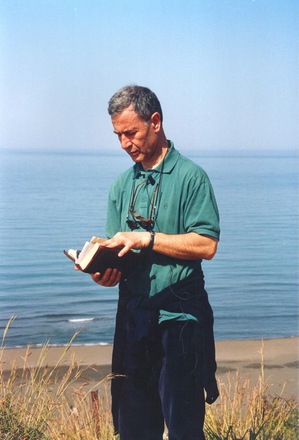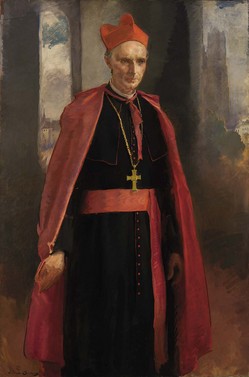The Diocesan Priest: A Religious?

Photo: Don Andrea Sartoro (born 7 September 1945, Priverno, Italy — died 5 February 2006) was a diocesan priest murdered in Santa Maria Church in Trabzon, Turkey where he served as a member of the Fidei Donum missionary program. At Don Santoro’s funeral at the Basilica of St. John Lateran, Cardinal Camillo Ruini mentioned in his homily that the possible beatification process for Don Santoro may be opened after February 2011.
Cardinal Piacenza on Priestly Celibacy, Part II
The Original Religious Order
Today I continue my commentary on Cardinal Piacenza’s presentation of the recent Papal Magisterium concerning Priestly Celibacy. GIven that the Cardinal draws upon Pope Pius XII’s Encyclical Sacra Virginitas and, thereby, suggests a parallel between the celibacy of the diocesan priest and the chastity vowed by the religious, I thought I might present Cardinal Mercier’s intuition and conviction that diocesan priests are, in fact, religious: religious belonging to the oldest Order in the Church, one founded by Our Lord Himself.
The Secular Priest
The expression “secular priest” is an unfortunate one. It somehow suggests that the diocesan priest is a man of the world, and that he is justified in taking on worldly ways: in his possessions, in his entertainment, his dress, his leisure activities, his habits of eating and drinking, his vacations, and in his way of interfacing with contemporary culture. Nothing could be further from the truth.
The Directory on the Ministry and Life of Priests
On January 31, 1994, Pope John Paul II promulgated a document prepared by the Congregation for the Clergy to encourage and guide priests in their pursuit of holiness, while setting forth certain norms of priestly conduct. The document got very little press coverage at the time. It sets the standard, as it were, for the ministry and life of diocesan priests, and deserves to be better known, studied, prayed over, and lived. You can find it here.
Living Chastely from One Mass to the Next
Chastity flourishes in a lifestyle that is courageously counter-cultural, bracing, joyfully austere, fully human, and wholly focused on the Altar, to which the priest goes and from which he comes, day after day. The priest who consciously lives from one Mass to the next will, necessarily, discover the blessed imperative of chastity, and embrace it manfully — temptations, struggles, humiliations, and battle wounds notwithstanding.
2. Pius XII and the Encyclical Sacra Virginitas
An influential contribution is made, from the magisterial point of view, by the Encyclical Sacra Virginitas, of 25 March 1954, of the Servant of God Pius XII. Like all of the Encyclicals of that august Pontiff, it is resplendent for its clear and profound doctrinal contribution, for the wealth of its biblical, historical, theological and spiritual references, and it constitutes even today a point of reference of notable merit.
If the Encyclical has as its formal objective, in its strict sense, not ecclesiastical celibacy but virginity for the Kingdom of Heaven, nevertheless there are many points of reflection and explicit references to the celibate condition and the Priesthood that may be found in it.
The Diocesan Priest: A Religious
I have often heard diocesan priests protest, “We are not religious!” and even more vehemently “We are not monks!” Of course, they are correct in asserting this, but only from a peculiarly canonical and legalistic perspective. The question merits some investigation.
 The saintly Désiré-Joseph Cardinal Mercier (1851-1926), Primate of Belgium and Archbishop of Malines, and one of the great hierarchs of modern times, made this long-debated and often burning argument the subject of a retreat he preached to his diocesan clergy in 1918. Cardinal Mercier’s retreat conferences were published in 1934 under the title, La vie intérieure: Appel aux âmes sacerdotales. Allow me to present an excerpt from his Fourth Conference: A Prejudice. The translation from the French is my own.
The saintly Désiré-Joseph Cardinal Mercier (1851-1926), Primate of Belgium and Archbishop of Malines, and one of the great hierarchs of modern times, made this long-debated and often burning argument the subject of a retreat he preached to his diocesan clergy in 1918. Cardinal Mercier’s retreat conferences were published in 1934 under the title, La vie intérieure: Appel aux âmes sacerdotales. Allow me to present an excerpt from his Fourth Conference: A Prejudice. The translation from the French is my own.
My very dear confrères, this is the fourth time that I’ve had the joy of preaching your retreat, and I really think that I’ve come to know you. So long as I speak of work, pastoral activities, and generosity of soul, all goes along wonderfully: my word finds an echo in you, and I see not a single frown on your foreheads. When I speak of penitence, recollection, austerity of life, you still follow me — less gaily perhaps — but with good will, while nonetheless toning down my words. It’s as if you were wanting to placate your consciences by saying, “Oh, yes, penance certainly, fasting, retreat; all of that is necessary, but not too much of it, because, after all, “we are not monks.” And when, finally, I get to the point of talking to you seriously about poverty, religious obedience, the life of interior prayer, well then, this doesn’t please a number of you. You think that I’m completely off the mark, and here’s the phrase that comes to your lips, “But, really, we are, all the same, not religious!”
Cardinal Mercier addresses the argument:
What then is the direct answer to the question formulated at the beginning of this talk: Yes or No, are we (diocesan priests) religious? Those [diocesan priests] who object that they are not religious, base their argument on this consideration: that they are not in the state of religious life. They are correct. They are not professed religious belonging to the canonical state of religious perfection. But, from that affirmation, it does not follow that they are not religious It does not follow that they are not bound to the perfection of life to which religious are bound. No, a thousand times no.
First of all, not only are diocesan priests religious, but they are such in the eminent sense of the expression. They are religious, by virtue of the clerical state. They reaffirmed themselves in their vocation at each one of the steps of their successive ordinations, until, on the day of their ordination to the subdiaconate, the Church entrusted them with the public prayer par excellence, the “Holy Office,” and entrusted them, on the day of their priestly ordination, with the cultic function par excellence, the liturgical celebration of the Holy Sacrifice of the Mass.
It’s a great pity that the rite of tonsure marking entrance into the clerical state was suppressed by Pope Paul VI in Ministeria Quaedam, 1 January 1973. The rite itself was a rich source of the spirituality proper to the diocesan clergy. The use of Psalm 15, Conserva me, Domine, together with the apposite orations of the rite, deserves, even, now to be meditated and held in the heart. As for Ministeria Quaedam, I think it needs to be, as a dear professor of mine used to say, “critically revisited”.
Yes, my dear Confrères, you belong to the first religious Order established in the Church: your Founder is Our Lord Jesus Christ Himself; the first religious of His Order are the Apostles; their successors are the bishops and, in union with them, the priests, all the ministers of Holy Orders right down to those just admitted to the clerical state, because they make profession of wanting nothing apart from God as their heritage, and the service of God as their lifetime occupation.
You are religious, and this in a primordial way. Given this, it would be unthinkable that one of you should argue that he is not bound to a perfection that, if nothing else, at least equals that of religious in their monasteries. The truth is, on the contrary, that you are bound, by virtue of your clerical state and, even moreso, by your priesthood, to a higher perfection than theirs.
I shall not grow tired of quoting Saint Thomas Aquinas’ declarations; they are so clear and so categorical:
“The monastic Orders come after the Orders of priestly ministry, they [the monastic Orders] must take them [the Orders of priestly ministry] as an example so as to elevate themselves to things of God.” (2.2.q. 18, a.8)
“The fact of being committed, by the reception of Holy Orders, to the service of Christ Himself in the Most Holy Sacrament of the Altar, imposes a stricter obligation of interior holiness than does the religious state.” (Ibid.)
The first religious of our Order knew no formula of engagement apart from these general declarations: that of Saint Peter, for example, “Lord, Thou knowest all things, Thou knowest that I love Thee” (Jn 21:17); or this other one: “Behold, Lord, we have left all things and have followed Thee” (Mt 19:27); or these two affirmations in which Saint Paul sums up the program of his apostolic labours: “But I most glad will spend and be spent myself for your souls” (2 Cor 12:15); and “Therefore I endure all things for the sake of the elect, that they also may obtain the salvation, which is in Christ Jesus, with heavenly glory” (2 Tim 2:10).
There you have it, my dear Confrères, the pastoral profession [of vows] that we must take up again! There you have the models that we are to copy!
[Consider] . . . the formula of your initiation into the clerical state: “The Lord is the portion of my inheritance and of my chalice; it is Thou that wilt restore my inheritance to me” (Ps 15:5). Is not this a translation of the Apostolic College’s formula of total abnegation and of attachment to God alone? And you subscribe to Saint Paul’s program of pastoral charity when, on the day of your priesthood, you acquiesce to this solemn warning of your bishop: “The Lord would have the ministers of His Church perfect in word and in deed, established in the twin virtue of love of God and of neighbour.”
Yes, we are religious . . . we are members of the Order founded by Christ, in His apostolate, perpetuated through the ages by the episcopate and by the ministers of the different orders of the hierarchy at the service of the altar.
We are pastors, sent out by Christ for the work of the redemption and the sanctification of the world: bishops, by virtue of the principle title that is theirs, and this for life; the others, by virtue of a subordinate title, as cooperators of the bishop, united to him in the care of souls, for the duration of their mandate.
We too have solemnly made our religious profession before God and before the Church. . . . We are religious, and we are pastors: united to Christ in His religious function before the Father; united to Him as His instruments in the work of redemption.
To be continued.

As a dear diocesan priest here called the secular priesthood: “the Order of Saints Peter and Paul.”
Thank you for this presentation,Father Kirby. It seems to me that the holiness of religious would always follow the example of our priests. We need topray and fast with deep commitment for saintly priests to follow.
I learn so much from you! Laudem gloriae!